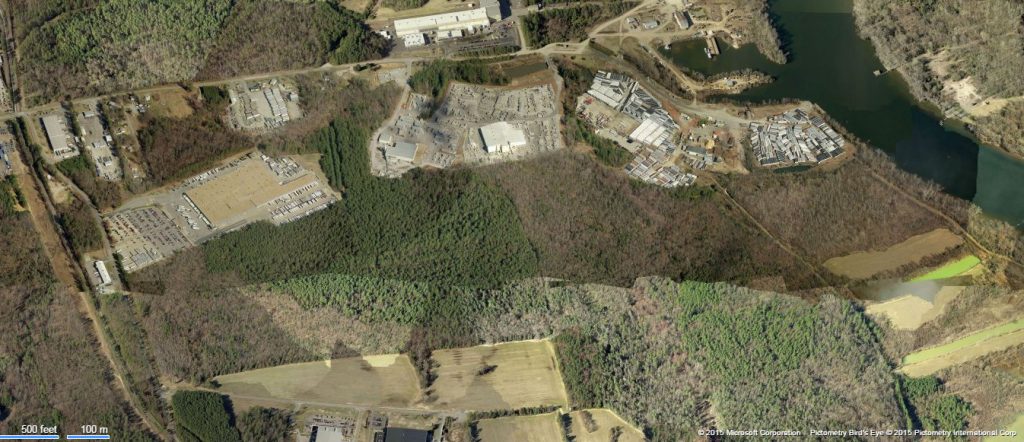With an initial $3 million land deal, a Chinese company has jump-started its planned $2 billion Chesterfield investment.
Tranlin Inc., a subsidiary of China’s Shandong Tranlin Paper Co., purchased the first 60-acre piece of its planned 850-acre paper and fertilizer complex in eastern Chesterfield County. It paid $3.18 million for the parcel in a sale that closed March 31, according to county records.
The 60 acres sit adjacent to the James River at the end of Willis Road. Tranlin bought the parcel from Allied Concrete, which still has operations farther down Willis Road.
With this first parcel in its pocket, Tranlin CFO Jill Douthit said the company can focus on acquiring the remaining 790 acres from its current owner, the Reynolds family. The land currently sits largely unused and forested.
The company should close on that sale by the end of June, Douthit said.
“We’re full steam ahead,” she said. “Everything is on track.”
Tranlin produces paper using straw, sourced from nearby farmers, and uses the leftover pulp after production to create fertilizer. The company last year announced its plans to construct its first U.S. factory, which include pouring $2 billion into the project and creating 2,000 jobs. The site will also support Tranlin’s North American headquarters.
The announcement at the time was touted as the largest economic development investment from a Chinese company in Virginia’s history. It was also the largest in a string of industrial development deals for the county that included landing facilities for Amazon, Medline, Capital One and Philip Morris in recent years.
It is unclear when construction on the facility will officially start, and the entire project is likely two to three years from completion, Douthit said. But Tranlin has started pulling together local resources, including contractors and architects for construction.
“We have some design and development work to do; it’s a pretty complex project,” she said. “We’re actively looking for vendors in the Richmond region to be involved in the construction.”
Design and construction plans for the factory and supporting buildings like offices are a long way from being finalized, Douthit said. She said it is too early to say what the total square footage of the development will be.
Douthit said the company will keep some of the forested areas intact on the 850 acres. The factory’s wastewater treatment facility will utilize the wetlands on the property, which include a 50-acre manmade lake.
Tranlin has also started reaching out to local farmers who could provide straw for the facility’s pending paper production.
“Realistically we’re two or three years out from buying straw, so a long way from now if you’re a farmer, but we’re building those networks now,” she said.
For now, Tranlin has an office in Charlottesville and has hired fewer than 10 people since making its Chesterfield announcement last year. The company’s senior engineer from China will soon visit the Virginia operation to get the ball rolling, Douthit said.
“Now that we have one parcel and the other one moving toward closing,” she said, “it’s time to get the engineers involved.”
With an initial $3 million land deal, a Chinese company has jump-started its planned $2 billion Chesterfield investment.
Tranlin Inc., a subsidiary of China’s Shandong Tranlin Paper Co., purchased the first 60-acre piece of its planned 850-acre paper and fertilizer complex in eastern Chesterfield County. It paid $3.18 million for the parcel in a sale that closed March 31, according to county records.
The 60 acres sit adjacent to the James River at the end of Willis Road. Tranlin bought the parcel from Allied Concrete, which still has operations farther down Willis Road.
With this first parcel in its pocket, Tranlin CFO Jill Douthit said the company can focus on acquiring the remaining 790 acres from its current owner, the Reynolds family. The land currently sits largely unused and forested.
The company should close on that sale by the end of June, Douthit said.
“We’re full steam ahead,” she said. “Everything is on track.”
Tranlin produces paper using straw, sourced from nearby farmers, and uses the leftover pulp after production to create fertilizer. The company last year announced its plans to construct its first U.S. factory, which include pouring $2 billion into the project and creating 2,000 jobs. The site will also support Tranlin’s North American headquarters.
The announcement at the time was touted as the largest economic development investment from a Chinese company in Virginia’s history. It was also the largest in a string of industrial development deals for the county that included landing facilities for Amazon, Medline, Capital One and Philip Morris in recent years.
It is unclear when construction on the facility will officially start, and the entire project is likely two to three years from completion, Douthit said. But Tranlin has started pulling together local resources, including contractors and architects for construction.
“We have some design and development work to do; it’s a pretty complex project,” she said. “We’re actively looking for vendors in the Richmond region to be involved in the construction.”
Design and construction plans for the factory and supporting buildings like offices are a long way from being finalized, Douthit said. She said it is too early to say what the total square footage of the development will be.
Douthit said the company will keep some of the forested areas intact on the 850 acres. The factory’s wastewater treatment facility will utilize the wetlands on the property, which include a 50-acre manmade lake.
Tranlin has also started reaching out to local farmers who could provide straw for the facility’s pending paper production.
“Realistically we’re two or three years out from buying straw, so a long way from now if you’re a farmer, but we’re building those networks now,” she said.
For now, Tranlin has an office in Charlottesville and has hired fewer than 10 people since making its Chesterfield announcement last year. The company’s senior engineer from China will soon visit the Virginia operation to get the ball rolling, Douthit said.
“Now that we have one parcel and the other one moving toward closing,” she said, “it’s time to get the engineers involved.”





Isn’t anyone else curious what effect this will have on the water quality, considering this is just upriver of the james river park system? 2,000 jobs sounds great, but not if it comes at the expense of Richmond’s greatest natural asset
Grant this is off Willis Road, below the Port of Richmond. The City’s James River Park system is above this area. This will have no effect of the City system but might cause issues for those parks/ wildlife landings on the Henrico/Charles City side of the river in this area.
More industrial development in one of the most polluted counties in the state will only make the problem worse. I’m sure it will add nicely to the already pungent smell on I-95 entering Richmond.